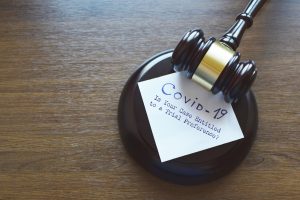 In the wake of the COVID-19 pandemic, the State and Federal Court in California have become severely backlogged. For months, the courts were closed entirely, hearing only the most urgent cases (such as domestic violence, restraining orders and other protective order type cases). The courts have slowly expanded operations and started hearing other non-urgent matters by video conference. Unfortunately, jury tirals are still on hold and these limited operations have not begun to make a significant dent in the major backlog of cases to be heard. There is a reported backlog of over a thousand criminal trials in California courts. Criminal defendants have the right to a speedy trial, so these cases must generally be given priority over civil matters.
In the wake of the COVID-19 pandemic, the State and Federal Court in California have become severely backlogged. For months, the courts were closed entirely, hearing only the most urgent cases (such as domestic violence, restraining orders and other protective order type cases). The courts have slowly expanded operations and started hearing other non-urgent matters by video conference. Unfortunately, jury tirals are still on hold and these limited operations have not begun to make a significant dent in the major backlog of cases to be heard. There is a reported backlog of over a thousand criminal trials in California courts. Criminal defendants have the right to a speedy trial, so these cases must generally be given priority over civil matters.
California Statutes That Create Civil Trial Preferences
Without any relief, the current backlog means that it could be months or even years before a civil case is scheduled for trial on a normal court docket. That being said, the California Code of Civil Procedure does create specific categories that allow a civil case to be given preference in trial scheduling. An experienced civil litigator can explain which, if any, of the following circumstances apply to an individual’s case:
- Code of Civil Procedure section 527(e) provides for trial preference where the plaintiff is seeking a preliminary injunction.
- Under Code of Civil Procedure section 1062.3, an action for declaratory relief only is automatically entitled to trial preference. However, where a plaintiff requests other relief in addition to declaratory relief, trial preference is discretionary.
- Code of Civil Procedure section 37 also provides for trial preference in civil cases where the plaintiff seeks damages alleged to have been caused by the defendant during the commission of a felony offense, for which the defendant has been criminally convicted.
Negotiating Cases That Would Face a Lengthy Trial Delay
Of course, many cases will not be entitled to a scheduling preference. These cases could sit on a clogged court docket for months, or even years. The delay will incentivize both involved parties to settle the case, rather than waiting years and dragging out the costly litigation. There are many different types of alternative dispute resolutions (ADR) that could be appropriate for certain cases or parties looking for a settlement. The simplest method to determine the appropriate ADR options is for the lawyers to meet and see if they can come to an agreement acceptable to their clients. The parties and their lawyers can also meet with a mediator who will help facilitate the process of reaching agreements. Finally, the parties can even agree to submit their claim to binding arbitration. In this case, an arbitrator is hired to hear the caseand and the decision rendered is binding upon the parties. The binding arbitration outcome can only be appealed to the court if there are legal grounds to do so.
Experienced Civil Litigators for Silicon Valley Business Issues
COVID-19 has caused drastic changes in the courts of California. Civil litigants need the advice of an experienced attorney who can protect their legal rights throughout delays and procedural changes. Call Structure Law Group at (408) 441-7500 or contact us through our website to schedule a consultation.
 Business Lawyers Blog
Business Lawyers Blog

